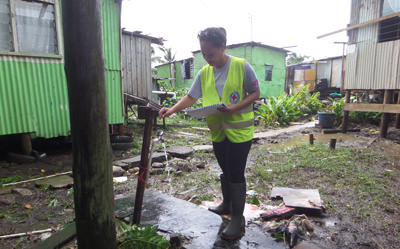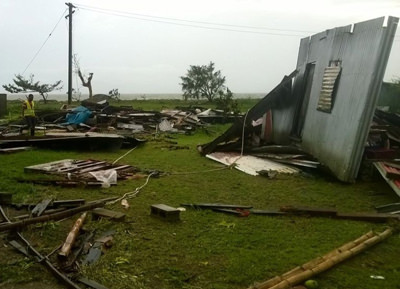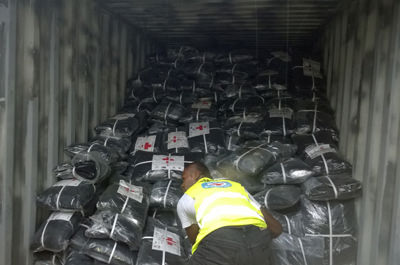
PETER WALTON, director of international programs at Australian Red Cross, explains why your money will do more for Fijians in the wake of Cyclone Winston than second-hand clothes…
Within minutes of launching our Tropical Cyclone Winston Appeal, people were messaging us about boxes of clothes and shoes they wanted to send to Fiji. Each time, with great regret, we gently suggested they reconsider.
As a charity, we absolutely hate to discourage generosity; generosity and compassion make our job much easier. The people who contacted us were acting on the most generous impulse possible – they saw a family who had lost everything, and immediately wanted to give that family something of their own. They probably spent time collecting clothes (and their neighbours’ clothes) in the hope that someone in worse circumstances would find them useful. It’s a true act of humanity, straight from the heart.
|
|
|
BRINGING RELIEF IN FIJI: Red Cross workers in the aftermath of Cyclone Winston which struck Fiji on the weekend of 20th and 21st February. PICTURES: Courtesy Australian Red Cross “Whilst international support is often required in disasters the magnitude of Cyclone Winston, the best way to support any country is by helping it to help itself. And that’s the most important point of all. The people of Fiji have the right to control what happens in their country: to ask for what they want and need, not simply take what they’re given.” |
And it’s logical at first glance. That family lost their clothes. I have clothes to give them: problem solved.
So why are we saying reconsider how you help?
Because the ugly truth is, a box of second-hand clothes or kitchen supplies or old shoes is unlikely to reach that family in need. If it even makes it to Fiji, it is likely to sit on the docks – as hundreds of similar boxes did in Vanuatu after Cyclone Pam last year – because no one has paid the fees to process or distribute them. Shipping containers of untracked, unsolicited donated goods were still sitting at Port Vila’s wharf at the start of this year, costing the government millions in storage fees.
Eventually your box of goods could end up as landfill, the last thing a country needs while cleaning up from a cyclone.
Often local customs services are so overwhelmed by the volume of unmarked goods that they can’t process essential relief items like tarpaulins, water purification equipment or medicines in time. We saw this happen in Nepal after the earthquake in 2015.
It would often cost far more to package, catalogue, ship, clear and distribute each box of donated goods than it would to buy relief supplies from local suppliers and organise a mass distribution to people who need them.
There are other, more positive, reasons to purchase relief goods locally. A disaster like Cyclone Winston can devastate local economies. Buying goods locally helps to kick-start local businesses again. Plus the goods are more likely to be matched to the needs and people on the ground. Samoans still talk about receiving shipping containers full of bras and high-heeled shoes after a cyclone a few years ago. When they were eventually distributed on a remote island, the local women used the bras to carry coconuts!
I’m not trying to put you off donating clothes. Just please don’t send them to Fiji. They haven’t been requested. Your local charity shop here in Australia will happily accept them and sell them to raise money for programs that help people in Australia and overseas. Red Cross has stores across the country, as do many other charities.
Whilst international support is often required in disasters the magnitude of Cyclone Winston, the best way to support any country is by helping it to help itself. And that’s the most important point of all. The people of Fiji have the right to control what happens in their country: to ask for what they want and need, not simply take what they’re given. Their government faces the massive task of directing the flow of aid into the country, so that relief efforts are not duplicated and go where they are needed most.
So if you have a box of clothes or other possessions you’d like to donate, please give it to a local charity shop. If you want your family to do something good, organise a fundraising event.
But if you want to help Fiji, here and now, the most effective way is with a monetary donation that will be translated into the most appropriate type of support based on local need. It will help the country get what it needs, when it’s most needed. It saves money and prevents waste.
To the thousands of Australians who help us in every crisis – from Syria to Separation Creek – I can’t thank you enough. Your generosity means the world.
Peter Walton is director of international programs at Australian Red Cross. This article was first published in the Courier-Mail and Adelaide Advertiser on 24th February, 2016.
To donate to the Australian Red Cross – Tropical Cyclone Winston Appeal, call 1800 811 700 or visit www.redcross.org.au/cyclonewinstonappeal.







